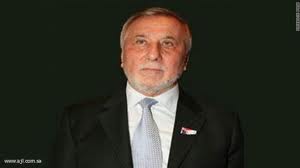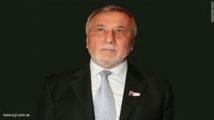Jordanian foreign ministry spokeswoman Sabah Rafi said the government considers Syrian ambassador Bahjat Suleiman "persona non grata and has demanded he leave the country within 24 hours."
"The decision comes after Suleiman's repeated insults to Jordan and its leadership, institutions and citizens, through his meetings, writings and social media websites," she said, cited by state-run news agency Petra.
Rafi said the government in Jordan, which is hosting hundreds of thousands of refugees from the conflict across its borders, had "repeatedly warned Suleiman not to exploit Jordanian hospitality."
"Suleiman used Jordan as a platform to question its positions and make false accusations and allegations against the kingdom," she said.
"He also used Jordan to directly insult brotherly and neighbouring Arab countries and insult their leaderships."
Around 100 Syrians held a sit-in outside Syria's embassy in Amman to express support for Jordan's decision.
"Jordan has always been a refuge for the free of the Arab world. Thank you Jordan," read a banner carried by demonstrators who chanted pro-King Abdullah II slogans.
Syria quickly reacted to Jordan's move and announced it was kicking out of Damascus the Jordanian charge d'affaires.
"The Syrian foreign ministry will order the expulsion of the Jordanian charge d'affaires to Damascus," said state TV channel Al-Ikhbariya.
It quoted the foreign ministry saying the decision came "in response to the Jordanian government's baseless decision to declare the Syrian ambassador to Amman persona non grata."
Jordan recalled its ambassador to Syria, Omar al-Amad, in 2011 after pro-Syrian regime protesters attacked the Damascus embassy.
- Rebel advances -
Last June, Jordanian Foreign Minister Nasser Judeh told Suleiman to stop criticising the country or risk expulsion, after he slammed Amman for hosting a meeting of the anti-regime "Friends of Syria" group, calling it "a meeting of Syria's enemies".
He also sharply criticised Jordan after the United States decided last year to send the kingdom a Patriot missile battery, F-16 fighters and troops to counter the threat posed by Syria's civil war.
The envoy has in the past described the estimated 600,000 Syrian refugees in Jordan as "terrorists."
Amman fears that the brutal war in neighbouring Syria could spread and has repeatedly warned of the impact of jihadists among anti-regime fighters.
Damascus, for its part, accuses Amman of backing the three-year uprising against President Bashar al-Assad by training and arming rebels -- a claim denied by Jordan.
On the ground, rebels advanced in Idlib province as Al-Qaeda's Syria branch, Al-Nusra Front, claimed responsibility for two car bomb attacks that killed 12 people Sunday in the central city of Homs.
Rebels, including Al-Nusra Front, took over "the Salam checkpoint west of the town of Khan Sheikhun after fierce battles against regime troops", the Syrian Observatory for Human Right said.
The Syrian Revolution General Commission, a network of activists across the country, said the checkpoint was "the last regime position" in the area in the south of Idlib province.
Khan Sheikhun "is now completely liberated," said the Observatory.
While rebels have been losing ground in the centre of Syria, they have in recent weeks been making steady progress in Idlib and north of neighbouring Hama province.
The Britain-based Observatory said opposition fighters have blocked access to the highway linking the south of Idlib province to rebel-held Morek in the Hama.
It said the latest advance brings rebels closer to taking over the Wadi Deif and Hamidiyeh army bases in the area, which opposition fighters have besieged for more than a year.
Also Monday, three people were killed in an aerial barrel bomb attack in the Aleppo district of Bustan al-Qasr, as the regime kept up its bid to reclaim opposition-held areas of Syria's second city, said the Observatory.
----------------------------------------------------------------------------
"The decision comes after Suleiman's repeated insults to Jordan and its leadership, institutions and citizens, through his meetings, writings and social media websites," she said, cited by state-run news agency Petra.
Rafi said the government in Jordan, which is hosting hundreds of thousands of refugees from the conflict across its borders, had "repeatedly warned Suleiman not to exploit Jordanian hospitality."
"Suleiman used Jordan as a platform to question its positions and make false accusations and allegations against the kingdom," she said.
"He also used Jordan to directly insult brotherly and neighbouring Arab countries and insult their leaderships."
Around 100 Syrians held a sit-in outside Syria's embassy in Amman to express support for Jordan's decision.
"Jordan has always been a refuge for the free of the Arab world. Thank you Jordan," read a banner carried by demonstrators who chanted pro-King Abdullah II slogans.
Syria quickly reacted to Jordan's move and announced it was kicking out of Damascus the Jordanian charge d'affaires.
"The Syrian foreign ministry will order the expulsion of the Jordanian charge d'affaires to Damascus," said state TV channel Al-Ikhbariya.
It quoted the foreign ministry saying the decision came "in response to the Jordanian government's baseless decision to declare the Syrian ambassador to Amman persona non grata."
Jordan recalled its ambassador to Syria, Omar al-Amad, in 2011 after pro-Syrian regime protesters attacked the Damascus embassy.
- Rebel advances -
Last June, Jordanian Foreign Minister Nasser Judeh told Suleiman to stop criticising the country or risk expulsion, after he slammed Amman for hosting a meeting of the anti-regime "Friends of Syria" group, calling it "a meeting of Syria's enemies".
He also sharply criticised Jordan after the United States decided last year to send the kingdom a Patriot missile battery, F-16 fighters and troops to counter the threat posed by Syria's civil war.
The envoy has in the past described the estimated 600,000 Syrian refugees in Jordan as "terrorists."
Amman fears that the brutal war in neighbouring Syria could spread and has repeatedly warned of the impact of jihadists among anti-regime fighters.
Damascus, for its part, accuses Amman of backing the three-year uprising against President Bashar al-Assad by training and arming rebels -- a claim denied by Jordan.
On the ground, rebels advanced in Idlib province as Al-Qaeda's Syria branch, Al-Nusra Front, claimed responsibility for two car bomb attacks that killed 12 people Sunday in the central city of Homs.
Rebels, including Al-Nusra Front, took over "the Salam checkpoint west of the town of Khan Sheikhun after fierce battles against regime troops", the Syrian Observatory for Human Right said.
The Syrian Revolution General Commission, a network of activists across the country, said the checkpoint was "the last regime position" in the area in the south of Idlib province.
Khan Sheikhun "is now completely liberated," said the Observatory.
While rebels have been losing ground in the centre of Syria, they have in recent weeks been making steady progress in Idlib and north of neighbouring Hama province.
The Britain-based Observatory said opposition fighters have blocked access to the highway linking the south of Idlib province to rebel-held Morek in the Hama.
It said the latest advance brings rebels closer to taking over the Wadi Deif and Hamidiyeh army bases in the area, which opposition fighters have besieged for more than a year.
Also Monday, three people were killed in an aerial barrel bomb attack in the Aleppo district of Bustan al-Qasr, as the regime kept up its bid to reclaim opposition-held areas of Syria's second city, said the Observatory.
----------------------------------------------------------------------------









 Home
Home Politics
Politics











